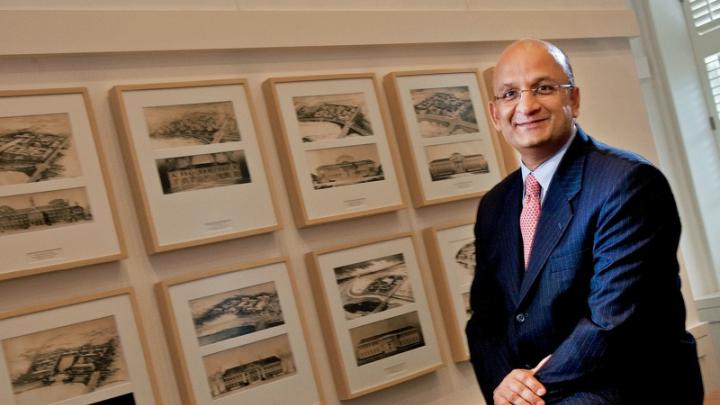When I arrived at Harvard Business School (HBS) in 1988, it was a thoroughly American institution. Perhaps 10 percent of the case studies analyzed during M.B.A. students’ two-year course utilized overseas business problems. The primary focus was on teaching future business leaders how to succeed in an American context.
While it may sound parochial today, it wasn’t then. It was the right approach for the time. In the 1980s, the best companies, the best management practices, and the best jobs were in America. People like me who were born in places like India and came here to study didn’t plan to go home—we intended to build careers here. I assume the same was true at Harvard’s other professional schools: while they admitted overseas students, most of those matriculants came here to succeed in America, and that’s what the schools aimed to teach them.
At HBS, that’s already changed a great deal—and between now and the University’s 400th birthday, it will change even more profoundly.
In 1941 Henry Luce famously described the 1900s as the American Century. Just a decade into the 2000s, it’s clear we are now living in a Global Century. There are plenty of economic data to support that contention, but it’s not just an economic phenomenon. Look at Sotheby’s and Christie’s, where India and China are increasingly important sources of contemporary art. Look at the winners of the Man Booker Prize, which is being awarded to an increasingly international array of writers.
The same is true in management. Today our alumni in banking are looking to invest all over the world. Alumni at multinationals are seeing the percentage of revenue coming from international operations increase. Most alumni will spend significant time abroad during their careers. Unlike in 1988, today HBS would be derelict in its mission if it wasn’t preparing the leaders it educates to succeed in a global context.
Some of this preparation takes place before students arrive at HBS. Today, three-quarters of our incoming students have spent at least a few months, if not longer, living, studying, and working abroad. Once they arrive, we seek to expose them to global business problems every day. Thirty percent of the case studies we teach to M.B.A. students focus on overseas business issues, and the percentage of our faculty members doing global research is rising steadily. To support these efforts, HBS now maintains research centers in Japan, China (in Shanghai and Hong Kong), India, Europe, and Latin America.
This strategy of chasing knowledge around the world and bringing it back to our classrooms in the form of cases and other research has served us well and will remain the foundation of our global efforts. This year, in addition, we will introduce changes into our M.B.A. curriculum, building on the spirit of innovation that has been a hallmark of HBS since its founding: witness the adoption of the case method in 1922. We are launching a new first-year course, Field Immersion Experiences for Leadership Development (FIELD), that will engage students in team exercises outside the classroom throughout the year, honing their leadership and entrepreneurial skills and their understanding of leading in a global context.
A key module of FIELD, the global experience, has its roots in trips our students used to organize during the winter break. Primarily career-focused, groups would travel to places like Silicon Valley or Frankfurt and meet with local businesses and entrepreneurs. Three years ago, we organized these trips into faculty-led immersions that incorporated a clear learning agenda. This past year, more than 400 students participated. In January 2012, we’re sending the entire first-year class of 900 M.B.A. students abroad. Working in teams of roughly six, they’ll be assigned a faculty advisor and a multinational or local company. Before the trip, each team will analyze a new product or service the company might introduce in the country the students are visiting. Students will do research, build a market profile, and come up with preliminary plans. Then they will travel to their designated region for roughly a week to test their ideas. They might interview customers, meet people in the supply chain, and visit competitors. They’ll realize that what they’ve conceived during late-night brainstorming in Allston will likely face unanticipated obstacles in Istanbul or Cape Town or one of the 12 other cities groups will visit. A short visit to another country won’t make any student an expert. But part of what we hope they’ll learn is contextual awareness, and even contextual humility.
FIELD is just one piece of a larger goal for the M.B.A. program: to try to narrow what some call the “knowing-doing gap.” Consider how our teaching compares with the professional preparation delivered at a medical school. We both teach theory, but medical students undergo much more field training in translating that learning into real practice; every hospital has a constant influx of patients to whom they can expose students. It’s much more challenging to inject business students into real-world managerial situations.
HBS pioneered the use of case studies to project students into the role of managers solving business problems—and by analyzing 400 cases in two years, students get a lot of practice at this. But they’re still imagining what they would do. FIELD, and other field-based courses more than a dozen faculty will offer as electives in the second year, aim to give our students meaningful and numerous opportunities to actually translate their ideas into practice. Our goal is not only to enhance our students’ experience, but to improve how management is taught. This is what HBS originally did with the case-study method, which today is used universally. Now it’s time to do the same thing with managerial field training. How do you structure the experience? What kinds of interventions do you need from faculty? What company support do you need? Our commitment is to develop a new method for doing this that will complement and enhance the case method. Our aspiration is for this field method, too, to become a standard that other institutions embrace.
We don’t have all the answers—and to a certain extent, we’ll be learning as we go, just as we expect of our students. But that’s true of all innovation. And for this Global Century, we’re pleased to be taking a step to ensure that today’s HBS graduates leave campus with at least one new stamp in their passports—a blot of ink that we hope will be just one element in a transformative experience.
Nitin Nohria is the George F. Baker professor of business administration and dean of Harvard Business School.









